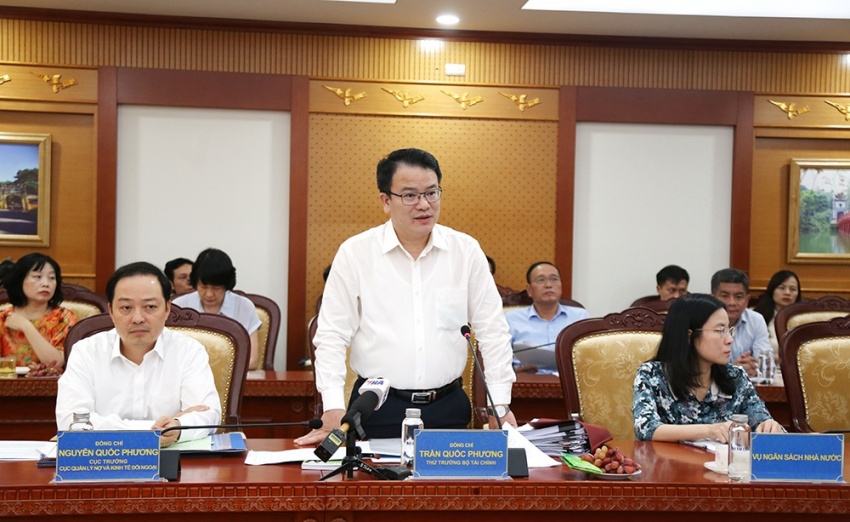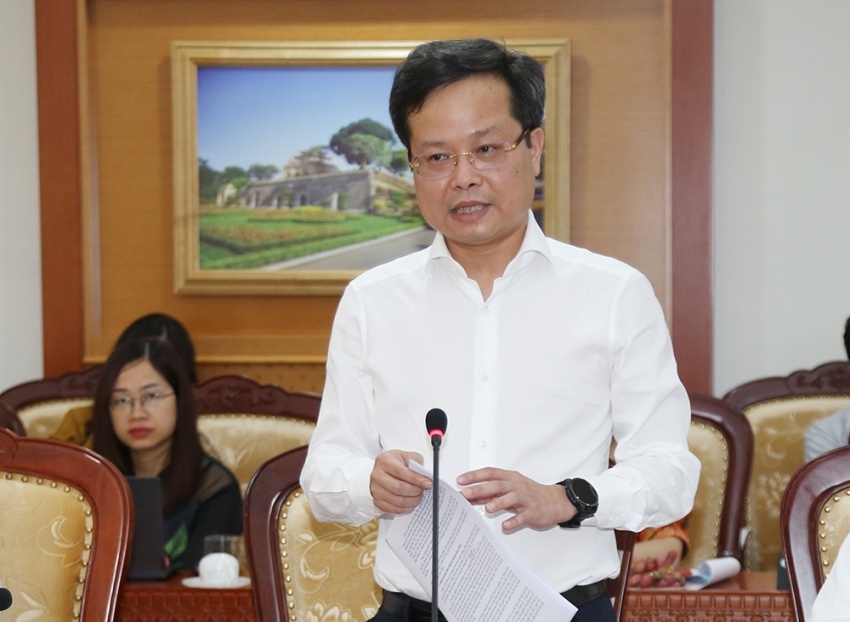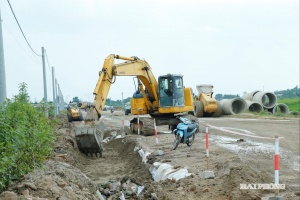INTERNATIONAL INVESTMENT
AND PORTAL
 Deputy Minister of Finance Tran Quoc Phuong
Deputy Minister of Finance Tran Quoc Phuong
On the afternoon of October 15, the Ministry of Finance (MoF) held an online conference focused on the disbursement of public investment capital from foreign sources in 2025. The meeting was chaired by Deputy Minister of Finance Tran Quoc Phuong, with representatives from eight central ministries and 31 localities in attendance.
In the opening remarks, Phuong emphasised that foreign-sourced public investment capital accounts for a significant share of total public investment nationally. "Therefore, accelerating the disbursement of this capital is not only an urgent requirement to boost growth but also a key task to ensure effective use of borrowed funds and maintain national credibility with international partners," he said.
Although there have been positive changes in public investment disbursement since the beginning of the year, results have still fallen short of expectations. The government and the prime minister have issued numerous resolutions and directives to address difficulties, but implementation remains slow.
Phuong said, “The goal of fully disbursing all public capital investment this year is extremely important. To achieve it, we must continuously review and promote progress, especially for capital from foreign sources.”
He urged all ministries, agencies, and localities to frankly and practically discuss the reasons why disbursement results have not significantly improved despite the removal of many regulations and mechanisms.
He also asked them to categorise their solutions proposed into two groups: short-term, urgent solutions to be implemented within the remaining two months of 2025 to accelerate the fourth quarter's disbursement, and long-term solutions for the post-2025 period to thoroughly resolve persistent issues and ensure more sustainable progress.
Although the legal and regulatory framework has been significantly improved, there remain bottlenecks such as land clearance, investment procedures, and coordination between different levels of government, all of which are long-standing issues that have yet to be fully resolved.
"We are nearing the end of the current term, yet some issues keep repeating year after year. The goal next year is not to rehash the same problems, but to move towards more effective, innovative approaches," Phuong said.
 Vu Hoang Nam, deputy director of the MoF's Department of Debt Management and External Economic Relations
Vu Hoang Nam, deputy director of the MoF's Department of Debt Management and External Economic Relations
Vu Hoang Nam, deputy director of the MoF's Department of Debt Management and External Economic Relations, said that 2025 is a pivotal year, both for completing the 2021-2025 socioeconomic development plan, and for preparing for the 14th National Party Congress and the next phase of development.
The government and the prime minister have been strongly directing efforts and issuing numerous policies to push for 100 per cent disbursement of public investment.
Ministries and localities have been reviewing and addressing obstacles to accelerate disbursement, especially for ODA (official development assistance) projects. Working groups and online conferences have been held to promote progress. In addition, new policies such as Law No.90/2025/QH15 and Decree No.242/2025/ND-CP have been issued to enhance decentralisation, simplify procedures, and improve the legal framework, all aimed at boosting public investment disbursement and driving economic growth.
"The MoF has treated disbursement as a top priority, implementing a wide range of measures, including issuing numerous official letters and directives urging agencies and localities to promptly allocate, record, and disburse capital," he emphasised.
In the context of administrative mergers and the two-level local government model, the MoF has proactively guided related issues such as on-lending agreements and worked with donors to adjust foreign loan agreements, ensuring continuity in project implementation.
The MoF also frequently works directly with major ministries, localities, and donors to resolve issues and speed up disbursement of ODA and concessional loan projects. In terms of procedures, the MoF has reviewed the withdrawal process, cutting processing times to just one working day for valid requests, ensuring both speed and efficiency in public investment capital use.
"Despite strong efforts, as of mid-October 2025, foreign capital disbursement had reached only 18.68 per cent, much lower than the 30.6 per cent recorded at the same time last year, and far below the government's 100 per cent target," Nam said.
Five ministries and localities had not disbursed any funds at all, mainly due to delays in land clearance, issues in bidding procedures, project and loan agreement adjustments, donor approval delays, and administrative mergers and natural disasters.
To speed up disbursement in the remaining months of this year, the MoF recommends that ministries and localities expedite investment procedures and finalise project legal documents; proactively coordinate with donors to resolve issues; strictly monitor progress and promptly report emerging problems; and focus on fully disbursing eligible projects to ensure 100 per cent capital disbursement by year-end.
As of October 14, the total foreign capital plan for 2025 assigned by the prime minister was VND23.4 trillion ($9.3 billion), including VND11.06 trillion ($442 million) for ministries and agencies, and VND12.36 trillion ($494 million) for localities. In addition, VND2.18 trillion ($87 million) of 2024 capital was carried over into 2025.
So far, 85.63 per cent of the planned capital has been detailed on the Tabmis system (Treasury and Budget Management Information System). The Ministry of Health, Ministry of Education and Training, Vietnam National University - Hanoi, and Ho Chi Minh City have allocated all of their assigned capital.
 Corporate bonds a critical lifeline for Vietnam's infrastructure ambitions
Corporate bonds a critical lifeline for Vietnam's infrastructure ambitions
With limited public funding, corporate bonds are emerging as a vital tool to attract long-term private capital and boost sustainable growth, especially as Vietnam needs $245 billion for infrastructure development by 2030.
 Public investment disbursement reaches $17.6 billion in nine months
Public investment disbursement reaches $17.6 billion in nine months
Prime Minister Pham Minh Chinh has ordered ministries and local authorities to urgently assess investment performance for the first nine months of 2025.
 Public investment makes an impact
Public investment makes an impact
The Ministry of Finance has shown optimism about the country's progress in public investment, which is helping the economy achieve its desired growth and control inflation.



















